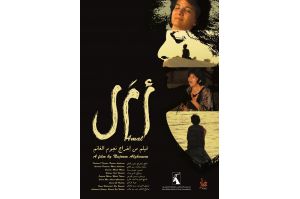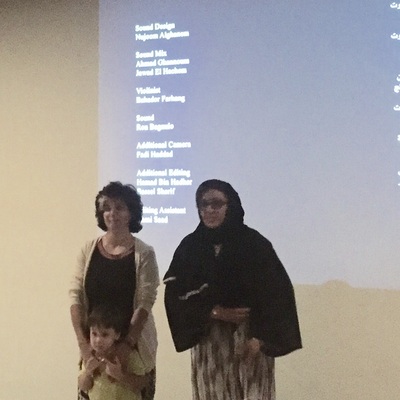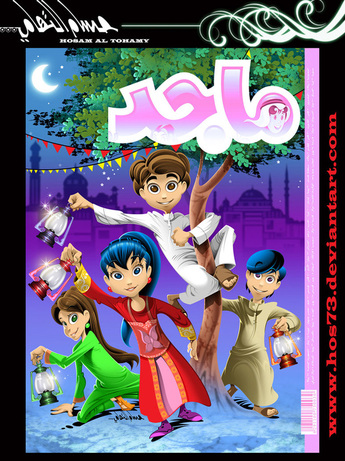|
by Rana Asfour Ask any boy and girl who grew up in the 80s in the Middle East to name the cartoon programs that define their childhood and my bet is that most, if not all, will list ‘Captain Majed’; A cartoon character in a Japanese program dubbed into Arabic about the life of a young boy ‘Majed’, who not only loved football but excelled at it and was captain of his team. Every Arab child wanted to emulate Captain Majed’s football skills and both boys and girls would sit transfixed in front of the TV mesmerized by the voice that would carve a place in each heart forever. I am one of those children, and as an adult I find myself sometimes winking at my husband and nodding towards our son after a football win he’s come back from giggling that we just might have our very own ‘Captain Majed’. And so, imagine my surprise to walk into a film screening only to discover that the documentary is about the voice behind this most treasured character and my utter delight that the most celebrated male in the Arab World is in fact voiced by a woman: Syrian actress, author and all-round artist Amal Hawijeh. ‘Amal’ is a full-length docu-film by Emirati film director Nujoom Al Ghanem, who I had met briefly for the first time last year at the screening of her 2010-film “Hamama’ at the New York University of Abu Dhabi. Al Ghanem is a formidable filmmaker not only for the subjects that she chooses but also for the artistic, even poetic, representation of people and places in her films that convey to the viewers the depth of humanity and human relationships and the complexities of our existence. She is unafraid to push boundaries to make films that rarely discuss certain societal issues in the UAE such as the situation of émigrés in the affluent Gulf country and the problems that they face. Yet, throughout her films she is conscious of doing so with a dignity and grace that take into consideration her film subjects as well as the sensitivities of the audiences that attend her screenings. In the film, Amal Hawijeh, narrates how in 2003 she came to be in Abu Dhabi after departing her beloved Syria for a job offer as star for an Emirati Children’s TV show and how after that job was completed, she stayed on to work at pan-Arab children’s magazine ‘Majid’ (unrelated to the Japanese cartoon character). It is not a decision she had taken lightly but feeling stifled and under appreciated in her home country she had agreed to temporarily relocate to Abu Dhabi to save up for a house back in Syria. Several years later, and it’s 2010 in the film and Amal finds herself at another crossroads in her life: Does she stay in the country she has grown to love and yet in which she feels as ‘a transient passer-by in other's lives, bored and lonely’ or is it time to answer the calling of a country, Syria, that is tugging at her heart to return to it and possibly to reignite her once-thriving and popular theatre acting career. Amal, which translates as ‘Hope’ in English, narrates her story in an uplifting tone most of the time. Yet behind the smiles and the positive attitude, lies deep pain as well. Pain that, as an émigré, she feels insignificant and obscured tired of having to explain to new people she meets who she is and what she has achieved. She misses her family, particularly her mother and we are allowed a brief snapshot of the depth of the relationship and possibly unresolved issues between the two when Amal is unable or un-wanting even to discuss a telephone call she has had with her mother on camera. Whether or not the issues are resolved we do not know but we do know that Amal’s mother passes away as Amal is in Abu Dhabi and this affects the actress and it is one of the few instances in which the brave façade she has set up shows signs of cracking. However, the passing of her mother prompts Amal to re-evaluate her life. There are many reflective meditative scenes and conversations to camera as Amal sits by the sea. In these moments another layer of Amal’s personality emerges, that of the spiritual, meditative, tree-hugging person that is in tune with the Earth and the universe. It is a beautiful carefree side of Amal.
Amal also misses her Palestinian-Syrian husband who happens to live in Greece and who she sees on and off as time permits him to travel to her. Why he is there and not with her is left obscure although it is implied that his involvement in politics may be responsible for the situation. However, their relationship is beautiful to watch and there is a depth and understanding and respect that translate beautifully on screen. The actress is a hopeless romantic as well. Amal is as multilayered in her personality as much as the film about her is multilayered in its themes. There is the idea of home and what it means and what it has come to mean to émigrés like Amal who can no longer return to their birth country because of the political situation and fear for safety and one’s life. It is the story of being far away from loved ones in a land not your own and trying to build a new life which is challenging by all accounts. Yet the film is also about friendships, new beginnings and making the most of what you’ve got. And though Amal is in a new job in Abu Dhabi concerned with theatres in schools, the political situation in her birth country Syria has allowed for a new layer of her personality to arise: the angry Amal. ‘I am angry because certain groups in the name of religion and politics want not only to rob us of our hope but they want to destroy our spirit completely. They have thrown us under the mercy of others and have created this unknown future that we can no longer plan for or even hope to plan for.’ The film won the Muhr Emirati main award at the Dubai Film Festival.
0 Comments
Your comment will be posted after it is approved.
Leave a Reply. |
Archives
March 2021
|








 RSS Feed
RSS Feed
